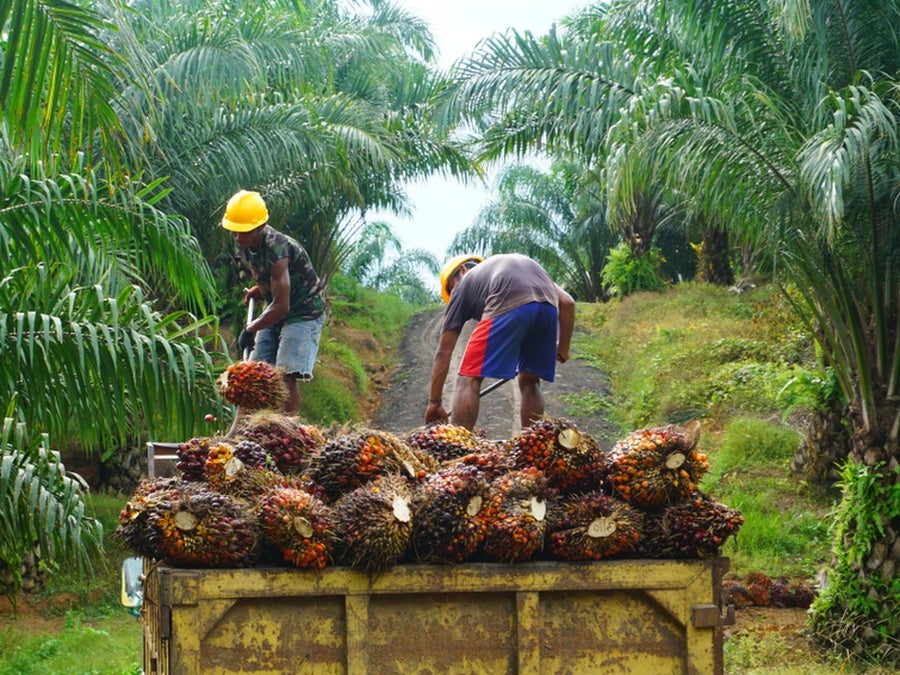
Food giants PepsiCo and FrieslandCampina have urged suppliers to stop sourcing palm oil from Indonesia’s Astra Agro Lestari.
The US and Dutch firms’ decisions are linked to a report in March last year from Friends of the Earth and its NGO peer The Indonesian Forum for Environment (Walhi) claiming abuse of power by Astra Agro Lestari (AAL) in Central and West Sulawesi.

Discover B2B Marketing That Performs
Combine business intelligence and editorial excellence to reach engaged professionals across 36 leading media platforms.
“AAL has faced mounting pressure over the past year after a report published in March 2022 by Walhi and Friends of the Earth US documented how AAL subsidiaries were operating on communities’ land without their consent and criminalising local farmers and environmental human rights defenders,” the US-headquartered NGO wrote in a statement last week acknowledging the actions by PepsiCo and FrieslandCampina.
Uli Arta Siagian, a forest and plantation campaigner at Walhi, added: “These suspensions prove that AAL’s destructive practices aren’t going unnoticed. AAL should read the writing on the wall and return land back to communities that was taken without their consent. AAL must also provide compensation for loss of livelihoods, clear the good names of those who have been unjustly criminalised, and issue an apology for its abuses.”
AAL had not responded to Just Food’s request for comment at the time of writing. Friends of the Earth confirmed via a spokesperson that the NGO has been in dialogue with the Indonesian firm and AAL shareholders such as US investment giant BlackRock.
The Indonesian business is owned by Jakarta-based Astra International, which in turn comes under the umbrella of global conglomerate Jardine Matheson.

US Tariffs are shifting - will you react or anticipate?
Don’t let policy changes catch you off guard. Stay proactive with real-time data and expert analysis.
By GlobalDataIn a general swipe, Walhi lodged criticism at CPG companies but, in PepsiCo’s case, recognised that the food and beverage maker has suspended sourcing palm oil from five mills “potentially linked to AAL’s destructive operations”.
“Consumer goods companies continue to make billions of dollars of profits while sourcing from palm oil companies that terrorise farmers and communities. They must use their global platforms and brand recognition to demand AAL remedy the harm it’s done,” the Walhi statement continued.
Meanwhile, PepsiCo said in a statement provided to Just Food: “We are very concerned about the allegations made against Astra Agro Lestari (AAL) and are reviewing them through our established grievance process. While PepsiCo does not source directly from AAL, we are engaging with suppliers who continue to source from them and have asked that they suspend the mills identified as being potentially linked to the grievance and underlying allegations.
“We are committed to playing our part to achieve our goal of transforming the palm oil sector and sourcing 100% sustainable palm oil.”
FrieslandCampina also provided a statement noting “responsible purchasing with respect for environment, biodiversity and human rights is important to us”.
The dairy firm added: “In October 2022, we received critical questions by an NGO. This motivated us to conduct further investigation. On the basis of the findings, we asked our supplier to no longer source materials from this palm oil producer.”
PepsiCo and FrieslandCampina are not the first food businesses to have grievances with AAL. Nestlé and Hershey suspended palm oil supplies last year, the two companies confirmed. US-based CPG major Proctor & Gamble (P&G) had also instigated its own independent investigation into the Indonesian firm.
A spokesperson for P&G confirmed that following the completion of a “third-party field assessment” in 2022, the company instructed its so-called Tier 1 palm oil supplier to suspend three subsidiaries of AAL – Mamuang, PT Lestari Tani Telada and PT Agro Nusa Abadi.
According to Friends of the Earth and Walhi, which has been a member of the NGO since 1989, the two bodies’ own investigations centred on “land grabbing, human rights violations, and environmental destruction in Indonesia”.
In a statement issued last October, they said: “Walhi and Friends of the Earth US first raised concerns in 2020 over abuses by AAL subsidiaries in Central and West Sulawesi”.
Gaurav Madan, the senior forests and land rights campaigner at Friends of the Earth US, said at the time: “Consumer goods giants must recognise that the dominant model of industrial agricultural production is predicated on environmental destruction and land theft. It’s time that companies and investors heed growing calls for a just transition away from industrial agribusiness.”
Hershey told Just Food the confectionery maker suspended AAL, as an “indirect supplier”, last September.
“At that time, we notified our direct suppliers that AAL will remain suspended until it is able to produce remedial timebound action plans and demonstrate and verify implementation of those action plans. Only at that point will we reconsider whether AAL is eligible for re-entry into our supply chain,” Hershey said in a statement.





